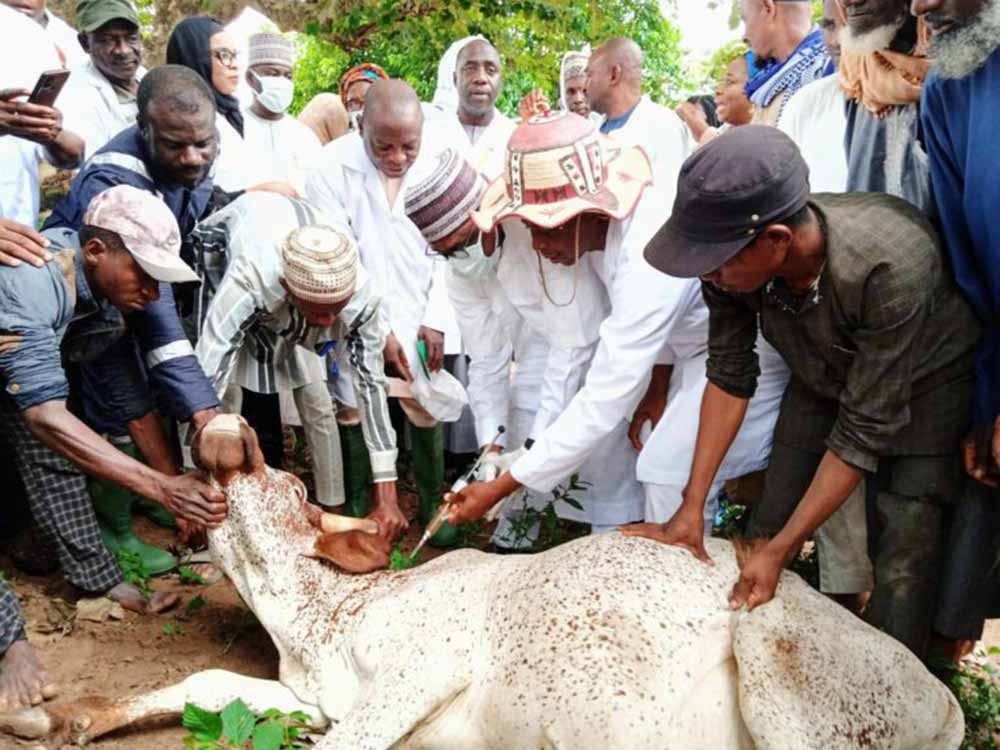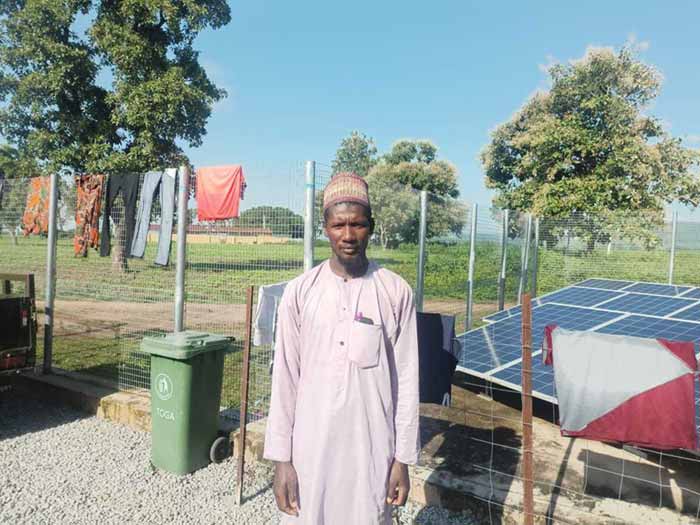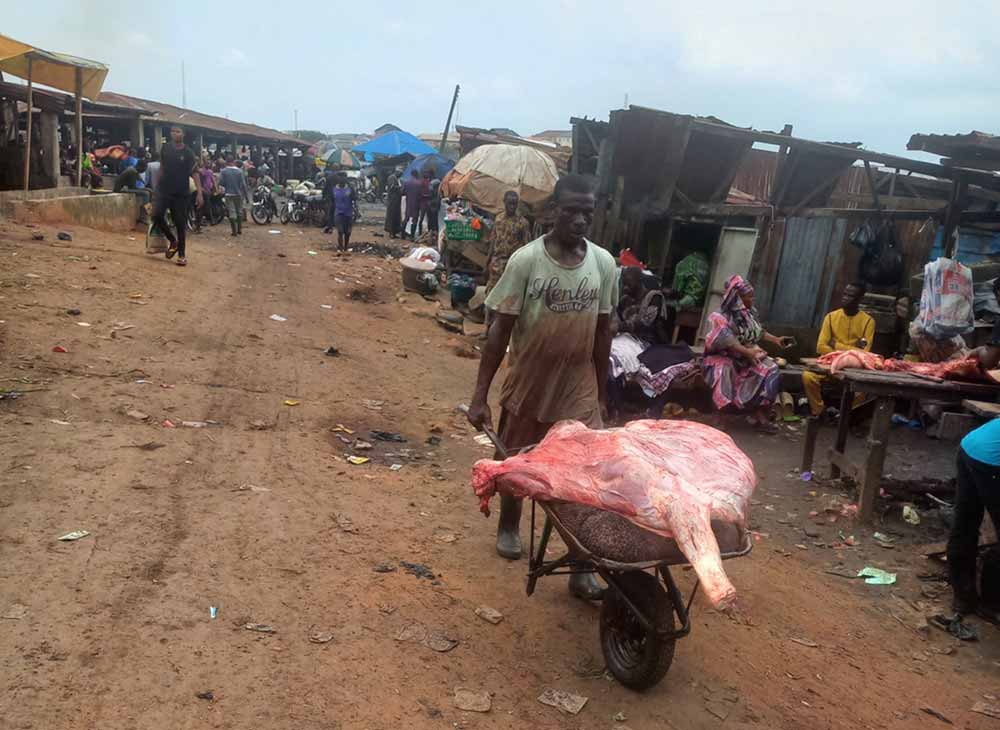
[ad_1]
Livestock keeper Muhammad Musa, who herds his cattle at Paikon-Kore Grazing Reserve in Gwagwalada Area Council, Abuja, was born into the commerce. Over the years, he has seen the intense and darkish sides of rearing animals.
When cattle fall sick with infections and die, it may be as painful as dropping an in depth relative, 31-year-old Musa mentioned.
“When we noticed that a cow was bleeding from the mouth, nose and ear, we quickly isolated it and alerted the secretariat.”
– Muhammad Musa, cattle herder
But when the an infection in query is probably zoonotic – that’s, able to being transmitted from animals to people – the occasion is each a tragedy and a terror.
Musa was recalling an incident that occurred in mid-July. A cow on the reserve had bled to demise. The suspected trigger was anthrax, a illness brought on by a spore-forming bacterium which generally infects ruminants reminiscent of cows, sheep, goats and pigs.

Credit: FCTA
Anthrax spores can survive within the soil for many years, and new outbreaks are sometimes sparked following soil disturbances, like floods or landslides. The spores are then ingested by grazing animals. People dealing with sick animals or dealing with or ingesting contaminated animal merchandise can get sick too – and symptoms in humans vary from pores and skin ulcers to bloody vomiting, drenching sweats and death.
The alarm over the useless cow was justified. Following an outbreak in neighbouring Ghana in June, well being authorities in Nigeria had been on pink alert for indicators of anthrax. Herders, abattoir operators and the general public had been warned to look out for indicators of the lethal illness.
“A team from the Agricultural and Rural Development Secretariat of the Federal Capital Territory Administration came to educate us on anthrax. They told us its symptoms in animals which include high fever, difficulty breathing and bleeding [from orifices] without blood clotting. When we noticed that a cow was bleeding from the mouth, nose and ear, we quickly isolated it and alerted the secretariat.
“We are additionally asking the federal government to maintain infrastructure and emergency preparedness in place and never return to sleep. There is a necessity for sustained motion. The surveillance needs to be lively. We mustn’t wait [to act] till it recurs.”
– Dr Olutoyin Adetuberu, President, Nigerian Veterinary Medicine Association
“A staff arrived shortly after, took samples and evacuated the carcass. Though the exams returned adverse, the attention has been serving to us to higher handle our livestock.
“About two weeks after that incident, another team of vets and health officials came with doses of anthrax vaccine and many cattle were vaccinated,” Musa instructed VaccinesWork on the grazing reserve one morning in late September.
Anthrax hits Niger State
Nigeria Centre for Disease Control and Prevention on July 17 introduced the index case of anthrax within the nation after samples collected from species of livestock on a farm within the Suleja space of Niger State, north central, returned constructive.
Eight animals had abruptly died on the farm, bleeding from exterior orifices with out blood clotting. Measures had been quickly instituted to curtail the unfold of the sickness.
On July 24, the Agricultural and Rural Development Secretariat kicked off a four-week mass vaccination that may ultimately attain 1.2 million cattle, sheep, donkeys and goats, together with 1000’s of cows at Paikon-Kore Grazing Reserve, the place Musa rears his cows. The programme, in keeping with media stories, was focused at masking livestock farms throughout the six space councils of the FCT, which share borders with Niger State.

Credit: Afeez Bolaji
Hashimu Muhammad, a pacesetter on the grazing reserve, mentioned out of 16,000 cattle, greater than 13,000 had been vaccinated.
“They promised us that the remaining cattle would be vaccinated in the second phase of the programme. I have more than 200 cows and about 70 of them have been vaccinated. None of our cattle has contracted anthrax. Our major challenge here is foot-and-mouth disease (FMD). Many of my cattle have contracted the disease. We need help. We need more vaccines; there are many cows to be vaccinated,” he mentioned.
Anthrax in Lagos – vaccine campaigns past
On July 30, Lagos, Nigeria’s most populous state, introduced that six animals examined constructive for anthrax. The Permanent Secretary of the state’s Ministry of Agriculture, Olatokunbo Emokpae, told the press that the contaminated animals had been burnt and buried to forestall unfold. The Federal Ministry of Agriculture and Rural Development additionally donated 50,000 doses of anthrax vaccine to the state.
“Members of the public must ensure that the source of their meat is from abattoirs recognised by the government. Anthrax is a public health issue and everybody must be involved. Agricultural department, health sector, information unit and non-governmental organisations need to do a lot of enlightenment.”
– Dr Rotimi Adesanya, public well being doctor
The President, Nigerian Veterinary Medicine Association, Dr Olutoyin Adetuberu, mentioned extra states throughout Nigeria had launched into mass anthrax vaccination of cattle with the assist of the affiliation.
“We have been creating awareness. We have had several radio and television engagements with the public and people phoned in to ask questions on the disease and preventive measures to take. Our members have also joined governments in their various states to carry out mass vaccination. It has been done in the FCT, Yobe State and recently in Imo State. We have had jingles in local languages to create awareness on the disease and I think that is what has helped us to nip it in the bud.

Credit: Adetuberu
“We haven’t had incidences past Niger State the place the index case occurred, and in Lagos. All different suspected instances returned adverse. The particular person on whose farm the index case was recorded in Niger State mentioned he was gifted an animal throughout Sallah [Muslim festivity held late June] interval and he launched it into his flock. That was how the case occurred.
“We have been going to abattoirs to talk to workers. We have been talking to herders and livestock farmers’ associations. We have also been engaging state governments to make anthrax vaccines available in their various states, especially those that border our neighbouring countries, for vaccination of local herds. We are doing all of these to ensure that anthrax does not become an epidemic in Nigeria,” she mentioned.
Adetuberu mentioned the affiliation additionally suggested folks to purchase their meat from recognised abattoirs, keep away from consuming animal pores and skin imported from different nations – at the least for now – and preserve a excessive degree of hygiene to forestall anthrax infections.
“In humans, anthrax infects the skin and digestive tracts. People should avoid contact with sick animals as much as possible. We are also asking the government to keep infrastructure and emergency preparedness in place and not go back to sleep. There is a need for sustained action. The surveillance has to be active. We should not wait [to act] until it recurs,” she added.
A public well being doctor and medical director, Federal College of Education, Lagos, Dr Rotimi Adesanya, suggested livestock farmers to make sure their livestock are periodically examined by licensed vets.
“Members of the public must ensure that the source of their meat is from abattoirs recognised by the government. Anthrax is a public health issue and everybody must be involved. Agricultural department, health sector, information unit and non-governmental organisations need to do a lot of enlightenment. It is a multi-sectoral responsibility and every stakeholder must be on their toes,” he mentioned.
Shoring up defences at an Ogun abattoir
Clad in a white robe and yellow boots, Dr Ayo Adelaja sank right into a plastic chair, stretching out his legs. He regarded up some data on his cell, whereas the sweat beading on his brow step by step evaporated.
It was about 10:00 on Friday, 22 September. The Ogun State veterinarian had simply returned to his workplace from one other spherical of inspections on the Kara Abattoir – an age-old, sprawling cattle market and slaughterhouse sitting between Lagos and Ogun state borders, southwest Nigeria.

Credit: Afeez Bolaji
Butchers say that a median of 60 cows are slaughtered within the abattoir each day to satisfy calls for from each states. If anthrax-contaminated meat slipped the online of surveillance and made its manner into public markets, human lives would cling within the stability. Vets like Dr Adelaja are an important security valve.
The Zonal Veterinary Officer overseeing abattoirs within the district, Dr Oduloju Tokunbo, calls the marketing campaign to maintain Nigerians protected from anthrax a “concerted effort”.
“The government is mobilising all relevant stakeholders and getting feedback through the Department of Veterinary Services. Vets and animal health scientists are on standby at abattoirs to carry out inspection and report back to the department. We also meet with butchers regularly to educate them on why inspection is important and the need to maintain hygiene. We educate them on anthrax and other diseases and where we need to resort to enforcement we don’t compromise.

Credit: Afeez Bolaji
“Emergency centres have additionally been opened up throughout the state. We organise sensitisation programmes in communities and associate with One Health Initiative to hold out campaigns. We are usually not leaving something to likelihood,” Tokunbo told VaccinesWork.
“We organise coaching classes for our members (butchers) on the perfect practices and invite well being consultants to teach us. With anthrax we’ve got stepped up the classes,” said Babalola Akeweje, the General Secretary at Kara Abattoir.
“Vets and animal well being scientists are on standby at abattoirs to hold out inspection and report again to the division. We additionally meet with butchers frequently to teach them on why inspection is essential and the necessity to preserve hygiene.”
– Dr Oduloju Tokunbu, Zonal Veterinary Officer
However, the government and traders have a pressing task before them to create the hygienic conditions they understand they need to operate securely. The dirt road that snakes to the market is ridden with mud and waste whenever it rains. Akeweje admitted that the road needs rehabilitation.
“We contribute cash amongst ourselves to do palliative work yearly along with paying tax. The authorities has promised to assemble it however we can not wait ceaselessly. A tarred street is a part of what we’d like for a clear setting,” he mentioned.
[adinserter block=”4″]
[ad_2]
Source link